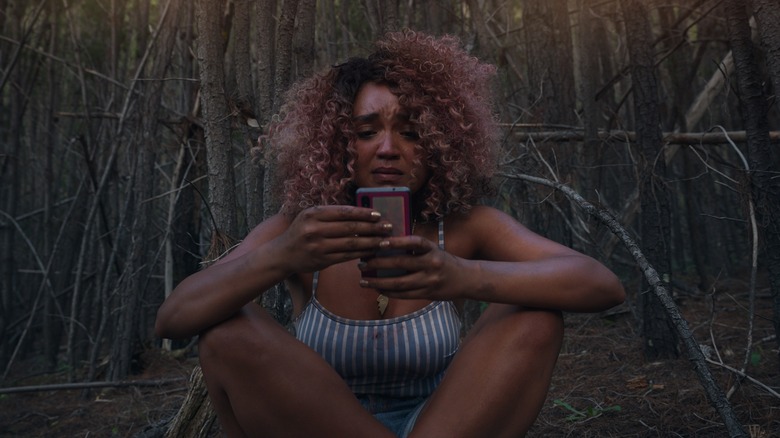
Hannah Barlow and Kane Senes' appropriately scorched-earth "Sissy" is more than a cautionary tale. As modern societal trends become horror's next flavor of the week, writer/director duo Barlow and Senes embrace influencer culture for all its toxic positivity. It's akin to "Superhost" or "Spree," where sociopaths chase audiences because they cannot connect in real life. Online communities promote safe spaces where outcasts can escape, but "Sissy" opts for graphic exploitation delirium to layer its warnings of healthy screen usage heavy-handedly. The film will be too fantastically overwhelming for some as realism strips away, but for those who love their videos nasty, it's an energetic breakdown with the widest eyes.
Aisha Dee stars as Instagram celebrity "@SincerelyCecilia," or to her long-lost childhood best friend Emma (Hannah Barlow), meek little Sissy. Their reunion in a drug store leads to Sissy being invited to Emma's engagement karaoke party, and a further invitation to Emma's "hen's weekend" (bachelorette party). Cecilia sniffs an opportunity to steal back the forever-friend she thought she had and reluctantly agrees. But Emma doesn't think the plan through. When Cecilia arrives with Emma, Emma's fiancée Fran (Lucy Barrett), and two party-hardy mates (Yerin Ha as Tracey; Daniel Monks as Jaime), she's greeted by the vacation house's owner: old prep school bully Alex (Emily De Margheriti).
It might be hard for audiences to digest how there aren't any characters who deserve our empathy. Most — plainly — suck. Emma ambushes Cecilia and Alex with each other's presence, miles from civilization outside Alex's gorgeous art-deco resort home. Cecilia's motivations are always a bit stalkerish since she reverts to her childhood self, the one Emma adored. Bystanders — psychologist student Fran, reality show superfans Tracey and Jaime — are just that. There's no rooting for anyone, but that's especially important to Barlow and Senes' exploitation model. For a situation to get this out of hand, the players need to be spectacularly loathsome. Cue the off-brand ugliness.
"@SincerelyCecilia" is a mockery of mental health gurus and life coaches with popular social media profiles and zero credentials. At dinner, Alex chastises Sissy for fooling her followers by putting on a camera persona nothing like the deeply disturbed woman behind glittery face masks or comfort rope circles. She's right — we know nothing of the Instamodels and Twitter Heroes with hundreds of thousands of subscribers deemed credible by social media standards. Cecilia flees into the bathroom and clutches her phone, counting "likes" and reading comments like "you saved my life" because online, she can fabricate the reality she desires — to the point where human interaction becomes no different.
'Sissy' Gets Better By The Second

"Sissy" gets better by the second, as Cecilia weaponizes her rebranded persona to the point where "Sincerely Cecilia" becomes a dual personality. Aisha Dee embraces social media behaviors as disturbing real-world practices, playing mousy and innocent as Alex screams insults like "psycho." Cecilia records new uplifting videos atop buried corpses and ushers cabin-in-the-woods gruesomeness that's far more successful than the fanciful satire. Characters remain in awe and unable to match the speed in which Cecilia loses control, which is a stylistic choice that'll ostracize those more interested in narrative scolding — that's not this violent, rage-fueled mishmash of victim-blaming and psychotic attention seekers.
The internet feeds on narcissists and loneliness, and rewards performative overzealousness, but it's not an answer. Barlow and Senes are not here to redeem the irredeemable. They're hellbent on exposing the ignorance we pass as "harmless" on daily feed scrolls.
Cinematographer Steve Arnold emphasizes "Sissy" through Cecilia's perspective, which stages scenes with a posh sense of serial killer mania. Cecilia hallucinates cosmic Snapchat filters covering wall-high windows as she rationalizes away murderous guilt, or whispers her soothing mantras until it's all the camera captures, blurring panicky targets in the background crying for help — it doesn't matter. Their voices fade away because the only voice Cecilia hears is her own, and she doesn't want to recognize anyone else unless they're telling her she's got nothing to worry about or apologize for because lies hurt less than acknowledgment. Cecilia imagines all these sparkly visual effects and Kenneth Lampl's meet-cute score, which creates an outrageous juxtaposition against the mindless slaughter. Bashed craniums, broken limbs in pretzel shapes, and gnarly kill sequences are a glamorous shade of depravity despite noticeable computerized blood.
"Sissy" is a movie that stirs internal conflicts but ultimately earns my appreciation through pure exploitation admissions. Aisha Dee captures victims like fireflies and encapsulates everything disgusting about social media princesses who take advantage of the very followers they claim to support — a frayed performance as Dee smiles like the devil. Influencers aren't inherently evil, only those who don't understand their position or become hypnotized by the internet's alternate realism. Hannah Barlow and Kane Senes choose the most in-your-face and extreme medium possible to drive their point home, messily and brashly but not without impact. Sadly, some only listen when the quiet part is said out loud — "Sissy" blares its concerns and horrors like neon demons in front of the brightest ring lights.
/Film Rating: 7 out of 10
Read this next: The Best Movies Of 2021
The post Sissy Review: When Influencers Attack [SXSW] appeared first on /Film.
from /Film https://ift.tt/I7FYyev
